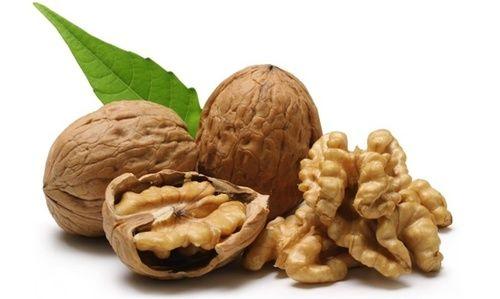, Naturopath
- omor 3 are a category of polyunsaturated essential fatty acids (such as omega 6). They are also sometimes referred to as Vitamin F (Fatty Acids). Useful for improve memory and counteract skin aging, they can be integrated into the diet thanks to particular foods. Let's find out what they are.
> What are omega 3s
> The properties
> Omega 3 supplements
Walnuts are among the foods rich in omega 3

What are Omega 3?
Technically, omega 3 are polyunsaturated fatty acids which, from a chemical point of view, have the characteristic of possessing a double bond in position 3 (omega 3) or position 6 (omega 6) of the chain that forms them.
They are technically referred to as EPA (eicosapentaenoic acid), and DHA (docosahexaenoic acid). These acids have precursors, i.e. substances that are transformed after their introduction into our body, specifically linoleic acid is the precursor of omega 6 fatty acid, while alpha linolenic acid is the precursor of omega fatty acid 3.
Omega 3 and 6 are essential fatty acids: this term means that our body is unable to synthesize them, and therefore the introduction through the diet is absolutely essential.
Properties of omega 3
They possess many qualities and the most relevant are certainly:
- The antiplatelet action (antithrombotic effect), i.e. they reduce the possible formation of blood clots
- Il control of the lipid level (fats) in the blood, especially triglycerides and cholesterol
- Blood pressure control as they keep cell membranes fluid, e give elasticity to the arterial walls.
- Il memory improvement and learning
- Counteracting skin aging
- A standout anti-inflammatory action (rheumatoid arthritis, Crohn's disease, pre-menstrual syndrome)
On the market there are food supplements based on omega-3 and omega-6 (pearls) whose intake is recommended on medical advice as, in high doses, they present contraindications. In fact, their blood thinning properties can cause sporadic nosebleeds. Gastrointestinal symptoms may rarely appear, stomach ache and burns.
Omega 3 among the natural remedies for cholesterol: discover the others

Omega 3 dietary supplements
What we will cover below are the main sources of these essential components naturally occurring in foods.
Omega 3s are generally found in the following foods:
- Fish such as salmon, mackerel, cod, swordfish, tuna, trout, sardine and herring (so-called blue fish), shellfish and fish oil (cod liver oil)
- Dried fruits especially walnuts and almonds
- Vegetable oils such as olive oil, linseed oil, hemp seed oil, perilla frutescens oil, rapeseed oil
- Flax seeds and Chia seeds
Flax seeds and linseed oil are by far the richest plant source of omega 3 and the most useful for maintaining a balanced diet even excluding foods of animal origin. It is important to know that linseed oil is a particularly delicate food: it must not be exposed to light and direct heat and, consequently, it cannot be used for cooking. Instead, it can be used as a raw condiment for vegetables, legumes and sauces, or as a simple food supplement (a spoon for breakfast). On the other hand, flax seeds, which must be rigorously ground in order to be assimilated by the body, can be added to salads, soups, smoothies.
Chia seeds contain a lot of calcium as well as the aforementioned omega 3 and omega 6. They are obtained from a plant species called Salvia hispanica, very widespread and used in Central and South America. They are suitable for those wishing to lose weight, as they are able to provide essential nutrients and energy without the body requiring to consume large amounts of surplus food.
Chia seeds can also be added to breakfast muesli or accompanied with cereals and other seeds, in a dose of one or two tablespoons a day as a natural food supplement, or they can be used as a condiment for numerous dishes including salads, pasta, risotto. , barley, millet, quinoa, legumes and other cereals to taste, or they can be added to fruit and / or vegetable smoothies.
There is a use of chia seeds considered particularly beneficial for cleaning the intestine and to promote its functioning. Left to soak in water at room temperature, chia seeds, capable of absorbing water in quantities much greater than their weight, release a beneficial gel that can be taken as such in the morning, preferably on an empty stomach.
Oil of Perilla Frutescens: it is obtained from an annual herbaceous plant belonging to the Labiate family. Perilla oil is presented as a light yellow liquid, limpid and transparent, with a characteristic aromatic odor, but more frequently it is proposed as a food supplement in pearls to facilitate its intake.
Oil and hemp seeds: the oil is obtained from the seeds of the homonymous plant (Cannabis sativa) and has a color ranging from light green to intense green.
Along with fish, flaxseed and related oils, hempseed oil is one of the few dietary sources of alpha linolenic acid (founder of the omega-three family). In particular, hemp seed oil is known for its optimal balance between omega-six and omega-three, present respectively in a 3: 1 ratio.
It is very important to choose products extracted by cold pressing and stored in dark glass bottles, tightly closed and stored away from sources of light and heat. After opening, hemp seed oil must also be stored and stored in the refrigerator.
READ MORE
Omega 3 are among the remedies for neuralgia: discover the others
Other articles on omega 3:
> Essential fatty acids and seeds
> Omega 3 among the natural remedies for seasonal allergies
> Omega 3 supplements for healthy skin and hair
> Do Omega 3 Help You Lose Weight?
> Omega 3 supplements in pregnancy
> Cod liver oil rich in omega 3: price and where to buy it
> The 10 benefits of chia seeds, rich in omega 3
> Food supplements, which ones to choose?
> Omega 3 for weight loss
| Urbanorganics.ca


























